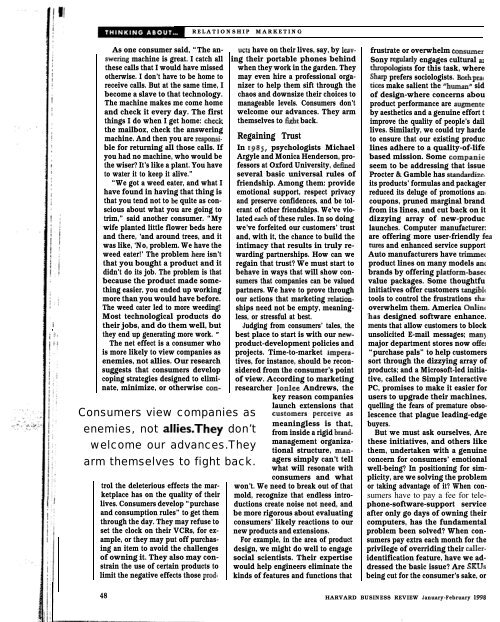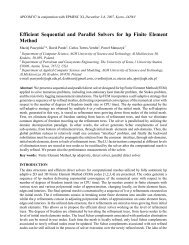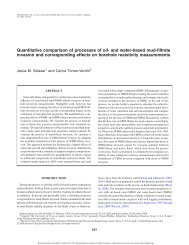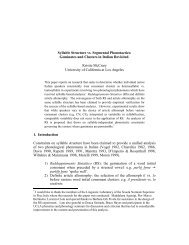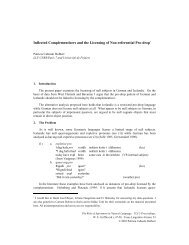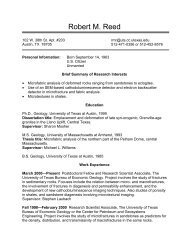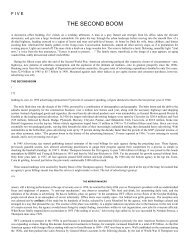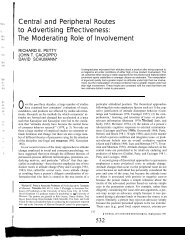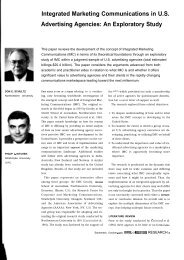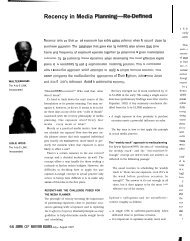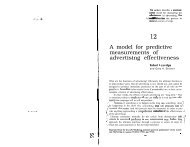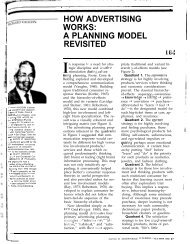preventing the premature death of relationship ... - UTS Web Server
preventing the premature death of relationship ... - UTS Web Server
preventing the premature death of relationship ... - UTS Web Server
Create successful ePaper yourself
Turn your PDF publications into a flip-book with our unique Google optimized e-Paper software.
i I<br />
As one consumer said, “The answering<br />
machine is great. I catch all<br />
<strong>the</strong>se calls that I would have missed<br />
o<strong>the</strong>rwise. I don’t have to be home to<br />
receive calls. But at <strong>the</strong> same time, I<br />
become a slave to that technology.<br />
The machine makes me come home<br />
and check it every day. The first<br />
things I do when I get home: check<br />
<strong>the</strong> mailbox, check <strong>the</strong> answering<br />
machine. And <strong>the</strong>n you are rcsponsible<br />
for returning all those calls. If<br />
you had no machine, who would be<br />
<strong>the</strong> wiser? It’s like a plant. You have<br />
to water it to keep it alive.”<br />
“We got a weed eater, and what I<br />
have found in having that thing is<br />
that you tend not to be quite as conscious<br />
about what you are going to<br />
trim,” said ano<strong>the</strong>r consumer. “My<br />
wife planted little flower beds here<br />
and <strong>the</strong>re, ‘and around trees, and it<br />
was like, ‘No, problem. We have <strong>the</strong><br />
weed eater!’ The problem here isn’t<br />
that you bought a product and it<br />
didn’t do its job. The problem is that<br />
because <strong>the</strong> product made something<br />
easier, you ended up working<br />
more than you would have before.<br />
The weed cater led to more weeding!<br />
Most technological products do<br />
<strong>the</strong>ir jobs, and do <strong>the</strong>m well, but<br />
<strong>the</strong>y end up generating more work. II<br />
The net effect is a consumer who<br />
is more likely to view companies as<br />
enemies, not allies. Our research<br />
suggests that consumers develop<br />
coping strategies designed to eliminate,<br />
minimize, or o<strong>the</strong>rwise con-<br />
RELATIONSHIP MARKETING<br />
Consumers view companies as<br />
enemies, not allies.They don’t<br />
welcome our advances.They<br />
ucts have on <strong>the</strong>ir lives, say, by leaving<br />
<strong>the</strong>ir portable phones behind<br />
when <strong>the</strong>y work in <strong>the</strong> garden. They<br />
may even hire a pr<strong>of</strong>essional organizer<br />
to help <strong>the</strong>m sift through <strong>the</strong><br />
chaos and downsize <strong>the</strong>ir choices to<br />
manageable levels. Consumers don’t<br />
welcome our advances. They arm<br />
<strong>the</strong>mselves to fizht back.<br />
Regaining Trust<br />
In 1985, psychologists Michael<br />
Argyle and Monica Henderson, pr<strong>of</strong>essors<br />
at Oxford University, de&red<br />
several basic universal rules <strong>of</strong><br />
friendship. Among <strong>the</strong>m: provide<br />
emotional support, respect privacy<br />
and preserve confidences, and be tolerant<br />
<strong>of</strong> o<strong>the</strong>r friendships. We’ve violated<br />
each <strong>of</strong> <strong>the</strong>se rules. In so doing<br />
we’ve forfeited our customers’ trust<br />
and, with it, <strong>the</strong> chance to build <strong>the</strong><br />
intimacy that results in truly rewarding<br />
partnerships. How can we<br />
regain that trust? We must start to<br />
behave in ways that will show consumers<br />
that companies can be valued<br />
partners. We have to prove through<br />
our actions that marketing rclationships<br />
need not be empty, meaningless,<br />
or stressful at best.<br />
Judging from consumers’ tales, <strong>the</strong><br />
best place to start is with our newproduct-development<br />
policies and<br />
projects. Time-to-market .imperatives,<br />
for instance, should be reconsidered<br />
from <strong>the</strong> consumer’s point<br />
<strong>of</strong> view. According to marketing<br />
researcher Jonlee Andrews, <strong>the</strong><br />
key reason companies<br />
launch extensions that<br />
customers perceive as<br />
meaningless is that,<br />
from inside a rigid brand-<br />
management organizational<br />
structure, man-<br />
arm <strong>the</strong>mselves to fight back. agers simply can’t tell<br />
trol <strong>the</strong> deleterious effects <strong>the</strong> marketplace<br />
has on <strong>the</strong> quality <strong>of</strong> <strong>the</strong>ir<br />
lives. Consumers develop “purchase<br />
and consumption rules” to get <strong>the</strong>m<br />
through <strong>the</strong> day. They may refuse to<br />
set <strong>the</strong> clock on <strong>the</strong>ir VCRs, for example,<br />
or <strong>the</strong>y may put <strong>of</strong>f purchasing<br />
an item to avoid <strong>the</strong> challenges<br />
<strong>of</strong> owning it. They also may constrain<br />
<strong>the</strong> use <strong>of</strong> certain products to<br />
limit <strong>the</strong> negative effects those prod-<br />
what will resonate with<br />
consumers and what<br />
won’t. We need to break out <strong>of</strong> that<br />
mold, recognize that endless introductions<br />
create noise not need, and<br />
be more rigorous about evaluating<br />
consumers’ likely reactions to our<br />
new products and extensions.<br />
For example, in <strong>the</strong> area <strong>of</strong> product<br />
design, we might do well to engage<br />
social scientists. Their expertise<br />
would help engineers eliminate <strong>the</strong><br />
kinds <strong>of</strong> features and functions that<br />
frustrate or overwhelm consumer<br />
Sony wuldy engages cultural a~<br />
thr0p010gist~ for this task, where<br />
Sharp prefers sociologists. ~0th pram<br />
tices make salient <strong>the</strong> “human” sid<br />
<strong>of</strong> design-where concerns abou<br />
product performance are augmente<br />
by aes<strong>the</strong>tics and a genuine effort t<br />
improve <strong>the</strong> quality <strong>of</strong> people’s dail<br />
lives. Similarly, we could try harde<br />
to ensure that our existing produc<br />
lines adhere to a quality-<strong>of</strong>-life<br />
based mission. Some companie<br />
seem to be addressing that issue<br />
Procter h Gamble has standardizes<br />
its products’ formulas and packager<br />
reduced its deluge <strong>of</strong> promotions an<<br />
coupons, pruned marginal brand<br />
from its lines, and cut back on it<br />
dizzying array <strong>of</strong> new-produc<br />
launches. Computer manufacturer:<br />
are <strong>of</strong>fering more user-friendly fea<br />
tures and enhanced service support<br />
Auto manufacturers have trimmec<br />
product lines on many models am<br />
brands by <strong>of</strong>fering platform-base<<br />
value packages. Some thoughtfu<br />
initiatives <strong>of</strong>fer customers tangible<br />
tools to control <strong>the</strong> frustrations thai<br />
overwhelm <strong>the</strong>m. America Onlim<br />
.has designed s<strong>of</strong>tware enhance.<br />
merits that allow customers to block<br />
unsolicited E-mail messages; man)<br />
major department stores now <strong>of</strong>fer<br />
“purchase pals” to help customers<br />
sort through <strong>the</strong> dizzying array <strong>of</strong><br />
products; and a Micros<strong>of</strong>t-led initiative,<br />
called <strong>the</strong> Simply Interactive<br />
PC, promises to make it easier for<br />
users to upgrade <strong>the</strong>ir machines,<br />
quelling <strong>the</strong> fears <strong>of</strong> <strong>premature</strong> obsolescence<br />
that plague leading-edge<br />
buyers.<br />
But we must ask ourselves, Are<br />
<strong>the</strong>se initiatives, and o<strong>the</strong>rs like<br />
<strong>the</strong>m, undertaken with a genuine<br />
concern for consumers’ emotional<br />
well-being? In positioning for simplicity,<br />
are we solving <strong>the</strong> problem<br />
or taking advantage <strong>of</strong> it? When consumers<br />
have to pay a fee for telephone-s<strong>of</strong>tware-support<br />
service<br />
after only go days <strong>of</strong> owning <strong>the</strong>ir<br />
computers, has <strong>the</strong> fundamental<br />
problem been solved? When consumers<br />
pay extra each month for <strong>the</strong><br />
privilege <strong>of</strong> overriding <strong>the</strong>ir calleridentification<br />
feature, have we addressed<br />
<strong>the</strong> basic issue? Are SKUs<br />
being cut for <strong>the</strong> consumer’s sake, or<br />
48 HARVARD BUSINESS REVIEW January-February 1998


